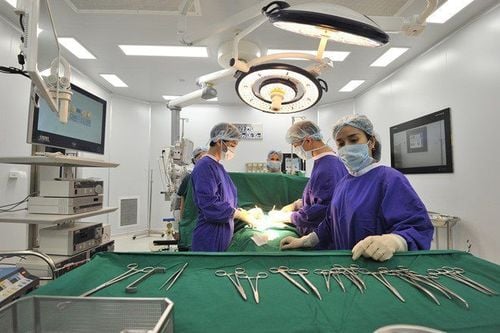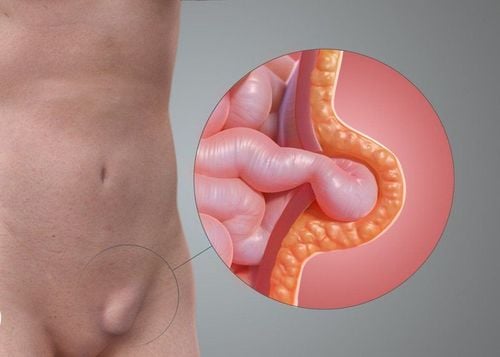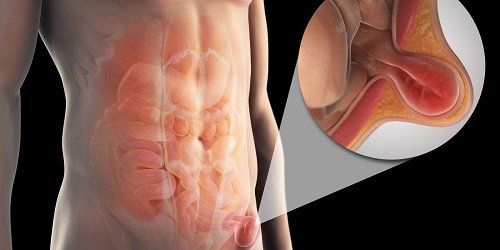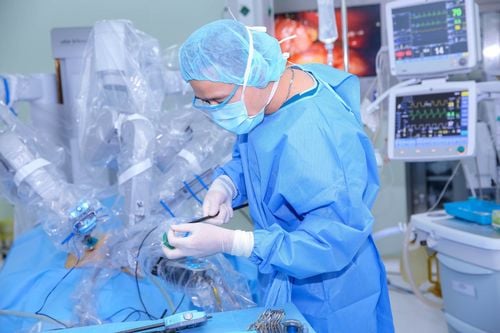This is an automatically translated article.
The article is professionally consulted by Doctor, Dr. Do Minh Hung - Department of General Surgery - Vinmec Central Park International General HospitalInguinal hernia is a disease that can cause many dangerous complications, but fortunately, it is curable. Robotic surgery can be used in the treatment of inguinal hernia as a highly accurate, minimally invasive method to help patients recover early.
1. What is inguinal hernia?
An inguinal hernia can occur at any age, on one or both sides of the groin. Men suffer more than women. Inguinal hernia in young children is the result of congenital anomalies due to the existence of the peritoneal peritoneum.Inguinal region has natural openings, during fetal development some anatomical structures pass to descend, such as testes from the abdomen running down into the scrotum in men. When these holes are enlarged, part of the abdominal organs such as intestines and large omentum pass through this hole, called a hernia. Inguinal hernia is manifested as swelling in the groin area, mostly in standing position or with exertion.
Common types of inguinal hernia
Indirect inguinal hernia: When viscera pass in the inguinal canal into the scrotum get. This form of hernia occurs in older people, strenuous work, prolonged constipation, prolonged cough, difficulty urinating (in prostatic hyperplasia)...
2. Is inguinal hernia dangerous?
Inguinal hernia causes discomfort and pain, especially with great exertion. The disease, if not treated in time, will cause many dangerous complications:Hernia strangulation is the most common complication of the disease. A strangulated hernia is a condition in which the large intestine or omentum is trapped in the hernia sac, at which point the hernia cannot be pushed up and is very painful. At this point, the patient needs to be examined and treated urgently. In men, inguinal hernia can be one of the favorable factors causing testicular torsion, testicular atrophy, strangulation of the vas deferens, causing testicular necrosis, increasing the risk of infertility. In women, although inguinal hernia does not affect fertility, but during pregnancy, abdominal pressure will make the condition worse. Any surgical intervention carries a certain risk to the health of the pregnancy. Therefore, if women are about to become pregnant and have signs of inguinal hernia, they should be examined and treated for stable disease first. It is also important to note that inguinal hernia is a disease that can be completely cured and does not affect fertility if it is treated early. Therefore, the patient should not be too worried.

Thoát vị bẹn gây gây khó chịu, đau tức, đặc biệt là khi gắng sức nhiều.
3. Treatment of inguinal hernia
The definitive treatment for inguinal hernia is surgery. Inguinal hernia surgery by closing the hernia hole and reconstructing the abdominal wall by placing a mesh is the commonly used method.Inguinal hernia surgery is quite common and has almost no risk, can be performed in many hospitals. However, about 2% of cases relapse within 3 years. There are also other complications such as: bleeding, damage to the vas deferens, numbness in the groin area, infection of the incision,...
Patients are operated by traditional open surgery method or minimally operated surgery. invasive depends on the condition as well as the condition of the patient.
Less invasive surgery includes robotic surgery (robotic surgery) and less invasive non-robot surgery (classic laparoscopic surgery). Minimally invasive surgery with high precision brings many advantages such as small incision, less pain, low risk of infection, short hospital stay, fast recovery time, less scarring, less blood loss, improved treatment results.
The biggest advantage of minimally invasive surgery is that the surgeon can easily see the vas deferens and blood vessels supplying the testicles, and at the same time can stitch the peritoneal canal (the cause of inguinal hernia in children). without touching the vas deferens or the blood vessels supplying the testicles. Therefore, minimally invasive surgery avoids two dangerous complications, namely vasectomy or testicular atrophy, complications that can be encountered during open surgery.
Robotic systems, such as the Da Vinci robot at Vinmec International General Hospital, help convert the surgeon's movements into machine movements through computer communication between the system working directly on the patient and the patient. remote and doctor's console.

Phương pháp điều trị triệt để bệnh thoát vị bẹn là phẫu thuật
At Vinmec International General Hospital, the examination process, the patient is thoroughly examined to choose the most optimal treatment. With today's most modern equipment system for robotic surgery, doctors, technicians and senior experts, inguinal hernia treatment will become safer and more accurate than ever. In addition, with the Hybrid clean operating room system, the risk of postoperative complications due to infection and infection is minimized.
Led by Dean, Doctor, Doctor Do Minh Hung, General Surgery Department of Vinmec Central Park International General Hospital has been achieving many successes in surgical treatment, bringing life back to life. better for the patient.
Doctor Do Minh Hung is also a member of the Surgical Association and the Vietnam Association of Laparoscopic Surgery. Before officially assuming the position of Head of General Surgery at Vinmec Central Park Hospital, Dr. Do Minh Hung used to be the Executive Vice-Dean of Gastroenterology Department - Binh Dan Hospital, lecturer of Pham Medical University Ngoc Thach and used to teach at the General Surgery Training Center - Binh Dan Hospital,...
With nearly 25 years of experience in the field of General Surgery, especially in the specialty Digestive - Hepatobiliary, Doctor Minh Hung has carried out dozens of valuable scientific researches, published many unique surgical techniques that bring positive treatment effects such as:
Laparoscopic curettage. Dissection of D2 lymph nodes to treat stomach cancer; Treatment of esophageal hiatus hernia by laparoscopic surgery; Laparoscopic esophagectomy in the prone position; Laparoscopic colectomy must remove the entire mesentery (CME),..
Please dial HOTLINE for more information or register for an appointment HERE. Download MyVinmec app to make appointments faster and to manage your bookings easily.













